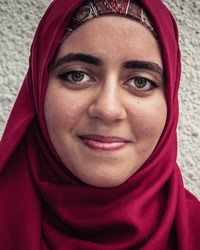The earliest known inhabitants of the area now known as Bosnia and Herzegovina were the Illyrians, who spoke a language related to modern Albanian. The Romans conquered Illyria after a series of wars, and Latin-speaking settlers from all over the empire settled among the Illyrians. In the Seventh Century, Slavs settled in Bosnia, Herzegovina and the surrounding lands. In 1463 the Turkish Ottoman Empire conquest at that time the independent Bosnian kingdom and it was the beginning of the influence of Islamic Civilization in Bosnia and Herzegovina. Although the Ottomans did not, as a rule, actively seek to convert their Christian subjects to Islam, it is thought that the greater rights afforded to Muslims in the Ottoman Empire motivated Christians to convert to Islam. Bosniaks are an ethnic group living in the Southeastern part of Europe, mainly in Bosnia and Herzegovina. The first wave of Bosnian people came to the United States in the 1990s resulting from war in their homeland.
The Bosnians in the U. S. are often found in St. Louis, Chicago, Detroit, Jacksonville, NYC, Phoenix, Atlanta, and Houston. They are especially numerous in St. Louis and Atlanta.
Most Bosniaks came to the United States during a time of political upheaval in their land. A few arrived in the 19th century, but most arrived between 1992-95. They are well-established in the United States, and they have their own cultural associations. They started off poor but have worked their way up into high paying jobs. Though Post Traumatic Stress Disorder affects some of them from the war in the 90s, most of them are acculturating and adapting well to life in the U. S.
Bosniaks have a low opinion of religion, so they seldom will listen to those who tell them about Jesus.
Most Bosniaks are Sunni Muslim, although historically Sufism has also played a significant role among them. For many Bosniaks, Islamic identity has more to do with cultural roots than with religious beliefs. Even among most religious Bosniaks, there is a disdain for religious leaders exercising any influence over day-to-day life. Bosniaks are no different than other Muslims in that they view Islam as being a foundational part their culture. This is one of the reasons Islamic people are so hard to reach for Christ.
The Bosnians in the United States are Muslim because it is part of their culture. Their hearts will not be full until they embrace the only Savior, Jesus Christ.
Ask the Holy Spirit to soften the hearts of Bosnians toward Christ so that they will be willing to allow Him to offer them life to the full. Pray that God will grant wisdom and favor to the mission agencies currently working among Bosnians. Pray that those receiving and viewing the JESUS Film will come to faith in Christ and that they will share the DVD with others, leading to a network of home fellowships among Bosnian families. Ask God to use the few known Bosnian believers in the United States as His vessels. Pray that God will meet the physical, spiritual, and emotional needs of Bosnians. Ask the Lord to raise up a church planting movement among the Bosnians in the U. S.
Scripture Prayers for the Bosniak in United States.
| Profile Source: Joshua Project |











